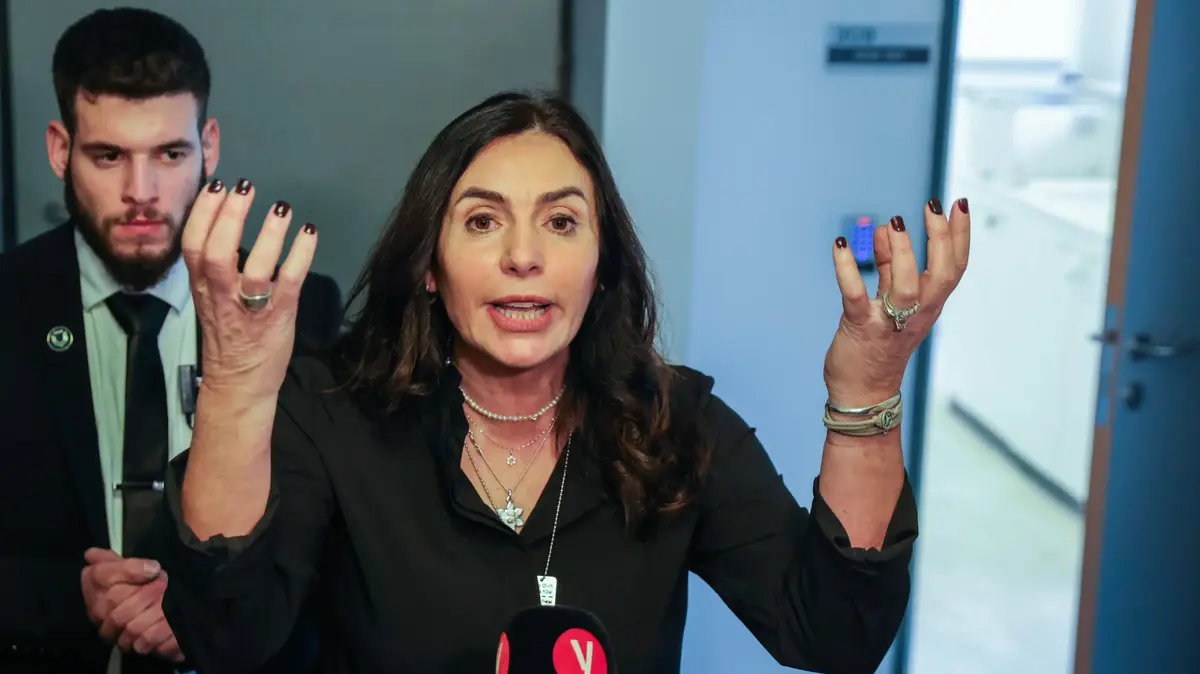An insolvency file centralizes all the procedures between the debtor and his creditors, thereby saving the need for legal proceedings (Photo: ShutterStock)
The phrase "insolvency" does not sound so sympathetic to those who are not really well versed in the field, but we can say on one foot that there are quite a few cases where people fail to survive financially, accumulate debts and enter into a financial crisis. What do we do to get out of this hole?
Lawyer Manar Naseraldin Khaled explains that in practice, those who suffer from economic collapse are mainly small businesses and ordinary citizens, and the insolvency procedure is a procedure in which a person declares that he is unable to pay his debts to suppliers, banks and the various creditors.
Lawyer Manar Naseraldin (Photo: Ganan Abu Rish)
What is an insolvency procedure for?
The Insolvency and Economic Rehabilitation Law, 2018-2018, is a relatively new law that entered into force in September 2019 and is essentially a renewal of the bankruptcy order that was used until its enactment. The purpose of the law is to allow any person or corporation that finds itself burdened with debts and cannot pay its debts on time, reach a settlement in a shorter and less cumbersome procedure than the one in the past. The goal is that during this period some of the debts will be returned and at the end of the procedure the debtor will be able to receive an exemption from the debts and bring about his financial rehabilitation as much as possible, allowing him to start a new page and start a new path free of debts. Is it possible to file for
bankruptcy Repayment of any amount of debt?
Regarding an individual, the rule is that you can submit an application to open insolvency proceedings for any amount of debt over NIS 53,745 (this amount is updated once a year). However, the insolvency procedure distinguishes between debts of more than NIS 161,236 and debts of a lower amount from this.
Insolvency proceedings of an individual with a debt of over NIS 161,236 will be managed by the supervisor of insolvency proceedings and economic consideration at the Ministry of Justice, while insolvency proceedings of an individual with a debt of less than NIS 161,236 but not less than NIS 53,745 will be managed in the enforcement system of the Enforcement and Collection Authority , except for special cases where the enforcement registrar finds special reasons justifying the opening of a procedure for an amount lower than NIS 53,745.
Insolvency proceedings regarding corporations are automatically transferred to the district court, depending on the corporation's registered address or the corporation's principal place of business, or the area where most of the corporation's assets are located.
There are two threshold conditions for submitting the application to open the insolvency procedure: 1. A corporation whose total debts are at least NIS 25,076.
This is a precondition for the approval of the opening of the procedure 2. A corporation which at the time of submitting the application is in a state of insolvency or in a situation where the procedure may allow it not to reach a state of insolvency.
What is the period of the procedure?
The entire procedure, from the moment of receiving an order called an order to open insolvency and economic rehabilitation proceedings, until the final stage of issuing an order for economic rehabilitation, which is actually a plan for the repayment of debts and the economic rehabilitation of the debtor, usually lasts about four years.
What is "fire" and what is "fire immediately"?
A debtor who initiated insolvency and financial rehabilitation procedures and met the conditions of an order to initiate the procedures, will receive a financial rehabilitation order detailing the conditions and monthly payments that the debtor will have to meet each month.
The amount of the payments will be determined by the relevant authorities according to the debtor's current earning capacity, after deducting living allowance from him.
If the debtor meets the monthly payments, he will be able to receive a discharge and bring the proceedings in his case to an end.
In special cases where the debtor's needs and basic living costs are higher than his earning capacity, in other words his financial situation is so bad that his monthly income barely provides for his living and allows him to maintain a basic and adequate standard of living for himself and his family, and provided that he acted in good faith, the legal authority within which The proceedings (determined according to the amount of the debts as mentioned above and the party that requested to open the proceedings) may order that the debtor receive an immediate discharge from his past debts.
Are the salary and the bank account protected from foreclosures in insolvency proceedings?
After the application is submitted and an order is issued to open insolvency and financial rehabilitation proceedings against the debtor, that is, from the moment it is announced that the debtor, whether he is a corporation or a private individual, is in insolvency proceedings, all debt collection procedures conducted against him are frozen until the end of the proceedings, in order to allow him to recover financially.
This is actually a procedure that occurs at the beginning of the insolvency procedure.
After all, the debtor can no longer pay off his debts, and the main goal of insolvency proceedings is to bring him to a position where he will be able to recover at the end of the process, and to give him another opportunity to turn over a new page.
Therefore, among other things, the legal proceedings against him will be frozen and his salary and bank account will be protected from seizure.
Is it possible to offer creditors a settlement in insolvency?
Yes, it is possible to submit an application for debt settlement according to the debtor's ability at any time, before entering into insolvency proceedings and also during the proceedings.
The approval of the application is subject to the approval of the legal authority under which the procedure is conducted, which will decide whether to forward the debtor's proposal for approval by the creditors.
How is the monthly payment determined in such a procedure?
The amount of the monthly payment and the payment period vary from debtor to debtor.
After the application is submitted and an order is issued to open insolvency and financial rehabilitation proceedings against the debtor, a trustee will be appointed who will be entrusted with the management of the debtor's assets and financial affairs and the concentration of his physical and financial assets in the female treasury, in order to realize them and repay debts to creditors.
After the creditors submit debt claims to the trustee, the latter will be required to examine the debtor's ability to repay, after deducting a living allowance that will provide for a basic economy and to maintain a basic and adequate standard of living for the debtor and his family members.
However, assets owned by the debtor can be divided among the creditors.
Based on the trustee's conclusions and recommendations, an order will be issued for the debtor's financial rehabilitation, which will determine, among other things, the amount of the monthly payment that the debtor must meet.
What are the advantages of insolvency proceedings?
There is no more oppressive feeling than waking up every morning with the fear of an unknown future.
A person caught in debt and a severe economic crisis will not be able to function properly in the face of phone calls from the bank, warnings from lawyers, foreclosures, restrictions, prison orders and other troubles.
He will not be able to work, not manage a bank account or open a business and this will have consequences for his private and family life as well, but it is important to know that there is light at the end of the tunnel.
The procedure has several advantages.
First and most important - the feeling that no one is chasing you, when the constant fear of creditors and foreclosures fades away, because as mentioned, throughout the entire process the debtor will be legally protected from foreclosures and collection procedures and/or from any legal process that may be against him.
Another advantage is that the insolvency file centralizes all the debts and procedures between the debtor and his creditors, thereby avoiding the need to conduct separate and independent legal proceedings against each of the creditors.
Another significant advantage is that the debtor continues to work and earn a living without the risk of salary garnishment, bank or other, hovering over him, and he can continue to manage a bank account and conduct himself financially during the process.
In addition, the debtor actually receives assistance to rehabilitate himself financially when he is given an orderly plan to improve his financial situation.
As long as the debtor cooperates, behaves in good faith and complies with the monthly payments set for him, at the end of the procedure he will receive a discharge of his debts and set out on a new and clean path.
Manar Naseraldin Khaled law firm is a boutique firm that provides legal advice and support in broad and diverse fields such as: tort law, enforcement and insolvency, labor law and more.
For contact and more details, you can contact by phone
- 077-9966247
on the office page on the legal website
The article is courtesy of Zap Legal.
The information presented in the article does not constitute legal advice or a substitute for it and does not constitute a recommendation for taking procedures or avoiding procedures.
Anyone relying on the information in the article does so at their own risk
In collaboration with legal zap
Sentence
additional subjects
Tags
insolvency











/cloudfront-eu-central-1.images.arcpublishing.com/prisa/KMEYMJKESBAZBE4MRBAM4TGHIQ.jpg)



